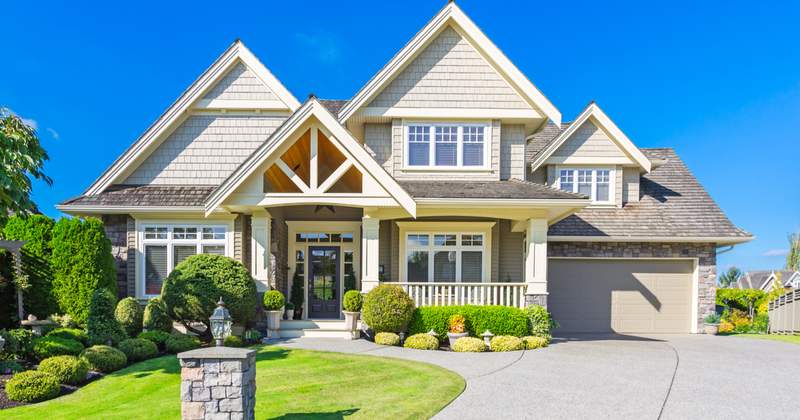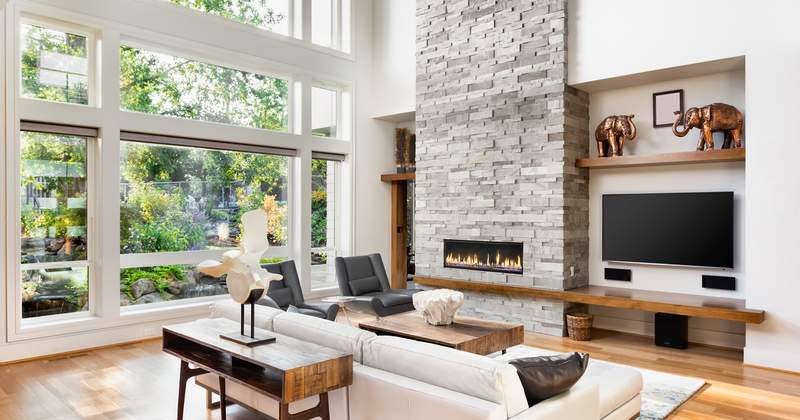|
With much of the country mostly staying home, it's not your typical spring homebuying season.
You might think social distancing has made it difficult to meet with lenders, view properties and sign paperwork, but fortunately that's not the case. In fact, prospective buyers and sellers continue to move forward with their housing needs and doing so with safety in mind. While the process may look a little different, modern technology is making it possible and, in some ways, more convenient. So how does it work?
The way we buy and sell homes may have changed for now, but it’s still an active and essential market. If you have any questions about making a move, please don’t hesitate to get in touch.
0 Comments
What Incentive is Better than Money?
9/23/2019
Are you wondering how to avoid getting into a fast and furious bidding war once you find your dream home? Even if you can afford to pay more, it’s not always the best move.
Money is one thing that turns sellers’ heads, but it's far from the only incentive when you’re competing with other buyers. So why raise the ante with more money? If you want to offer your seller something they can't refuse, try offering a flexible closing date. Why is the closing date important? On closing day, the home’s sales documents are signed and ownership changes hands. In most cases, that’s about 30 to 60 days from when your offer is accepted. But what if that doesn’t work with the seller’s timeline? How can a flexible closing help you? Some sellers need to get out fast. They could be relocating and need to move immediately. Maybe they already bought a new home. By offering a fast closing, you can help them to avoid paying two mortgages. Other sellers need more time. Maybe they're building their dream home and hit an unexpected construction delay. Your flexibility with a delayed possession date offers them the security of having their new home lined up before they have to move. How else can we sweeten the deal? Let’s say the best bid you can make is a bit lower than the listing price. Offering a seller rent-back might encourage them to choose your offer over others that are less accommodating. This lets the seller rent the space from you for a set amount of time until they’re ready to move. To make a flexible closing date work for you, remember to go on a month-to-month lease or have alternative housing options ready. When you’re ready to make an offer on a home, keep in mind that understanding what motivates the seller is how we’ll get your offer accepted. Ready to start your search? Reach out today. Buying With Friends Isn't Like Renting
You’ve been living with your best friend since freshman year of college, and it’s been a blast. So why not pool your money and go in on a house together? After all, it’s easier to buy when you have two incomes. It’s true that co-buying a home with friends or family can make it easier to own a home. And it can reduce your upfront costs. But there are a few unique differences to co-buying. Here are three you should consider and discuss before you jump into the process. 1. What type of ownership will you have? Don’t assume that splitting the mortgage determines the ownership. If one person will be paying a larger portion, you might want to be tenants in common. This also allows you to transfer or sell your share of the property at any time. But if you want to divide the ownership equally, you can choose to be joint tenants. 2. How are your credit scores looking? When two buyers are on a mortgage app, lenders use the lowest credit score to determine the interest rate. Do you both have excellent credit? If not, you could have only one person on the mortgage loan, but you’ll only be able to count one income to determine the loan size. 3. How will you pay your bills each month? This sounds like a minor detail, but it’s important to be on the same page about finances before the bills come in. Will you pay bills out of a joint household account? Or will one person pay the full bill and have the other pay them back? Once you’ve discussed your plans for the finances and ownership, your best bet is to have a legal agreement prepared ahead of time. Have more questions about co-buying a home? Reach out today to discuss your needs and get the process started. Don't Get Blindsided by Closing Costs
6/24/2019
Have you ever decided to buy something, only to find out about additional costs at the end? The last thing you want is to be surprised by unexpected fees – especially at your closing.
You’ve made your financial calculations. Extra charges at the eleventh hour could make all your plans go bust. But you can't just skip the closing – that's when the legal ownership is transferred. Want to avoid being blindsided at your closing? Here's how to plan ahead for closing fees: What’s the deal with closing costs? Closing costs typically run about 2% to 5% of the purchase price and are paid to lenders, attorneys and other third parties. Buyers often have more closing costs than sellers because most fees are related to the new mortgage loan. Common closing costs for buyers:
How can you lower the costs? After applying for a mortgage, you’ll receive a Loan Estimate from the lender. It summarizes the loan terms, such as the loan amount, interest rate and all closing costs. Comparing Loan Estimates from different lenders is important. Page 2 of the Loan Estimate also details the services you can shop around for, such as surveys, appraisals and title searches. Are closing costs ever negotiable? Yes. A seller or buyer sometimes agrees to pay part or all of the other party’s closing costs. This is something we can negotiate into the purchase agreement. As for paying the closing costs? Some lenders will allow you to roll the cost into your mortgage. However, you’ll pay interest on it for the life of the loan. Paying cash upfront is a smarter option if you have the funds available. Have more questions about closing on a home? Or are you ready to get your home search started? Reach out today. Have You Checked Out the Neighborhood
5/20/2019
You wouldn’t pick out shoes before choosing an outfit, right? Or buy car accessories without first deciding if you want a truck or a sedan?
Well, house hunting should be treated the same way. You shouldn’t search for a dream home without vetting neighborhoods or experiencing the new area for yourself. If the area doesn’t meet your needs, the property may not provide a dream scenario. So how do you make sure you’ve found the right neighborhood? Keep these details in mind: Cost of Living Are the property taxes and HOA fees trending upward? Are there mostly trendy boutiques and high-end businesses in the area, or does it have a good mix of local and national retailers? Planned commercial development could affect the long-term affordability of the area. However, having more access to retailers and entertainment could enhance your lifestyle. Commutes and Social Life How close do you want to be to the friends and family you visit the most? How far are you willing to drive to get to the restaurants, theaters or stores that you frequent? It’s understandable to prioritize your work commute, but keep in mind the other places you visit on a daily or weekly basis. Long-Term Goals How does the community fit into your future goals? Are there good schools, parks or sports leagues for your family? A thriving community adds to your quality of life. And it’s a good sign for future home values. Want to try before you buy? Where possible, consider renting a unit in the area for a few days through a short-term rental site. Experiencing the neighborhood like a resident can help you to decide if it fits your current and future needs. Are you looking for a new home? Get in touch if you’d like to see a neighborhood report. Want to take the pain out of homebuying? Keep your lifestyle priorities top of mind.
If you’re planning to buy a new home, there’s great news: More houses have hit the market in recent months. This means you’ve got more options to choose from. Choice is always good, but it can also be overwhelming. The key? Careful, disciplined prioritization. Let’s go beyond square footage or the number of bedrooms and consider how the property fits your life. By focusing on what matters the most to you, we can refine your search to the closest matches. Here are the three questions every potential homebuyer should ask themselves: Where do you want to live? Think beyond your commute. Do you want to be in a specific school district? How much street noise can you cope with? Are you looking for an established neighborhood or one that’s up and coming? That could affect future home values. What does the future hold? Think about the next 10 years. Are you planning to have kids? Will your aging parents move in? If you plan to stay for the long haul, you might want a property to accommodate your family today, and in the future. If you know your career will have you on the move, will you want to sell the property or rent it out? How much work are you willing to do? When considering condition, be honest with yourself. How much work are you truly willing to take on? If the home needs cosmetic updates, will you want them completed before you move in? If you fall for a fixer-upper, do you have a budget for renovations? Communication is a critical element of your home search. The more information you share, the better we’re able to match you with a home that fits your life. Got your priorities in order? Let’s find your dream home. Reach out today. Buying a Home is a Big Undertaking
1/2/2019
Buying a home is a big undertaking. From finding the right property and negotiating to sorting out the legal details and moving in, there are dozens of important steps along the way. And for many first-time buyers, it can seem overwhelming.
Fortunately, there are a few things you can do to make the process easier, even if you’re still in the planning phase. If you know buying a home is on the horizon, you’ll want to tackle these tasks before you get too far into your search: 1. Get preapproved for your mortgage. Research lenders, choose your mortgage company and apply for preapproval. This will give you an idea of what you can afford so we can point you toward homes in the right price range. 2. Give your budget a test run. Once you have a rough estimate of what your monthly payment will be, give that budget a trial run. Are you still able to afford all your monthly bills and expenses? If not, let’s have a chat with your lender to see what the monthly payment could look like if we target a lower price point. 3. Start saving. It’s never too early to start saving up for your down payment and closing costs. Cutting out unnecessary spending and setting up automatic deductions from your paychecks are two easy ways to give your savings a boost. 4. Create a wish list. What do you want in your future home? Jot down your must-haves concerning size, location and features. You can also include some deal breakers to help guide you in your search. Are you looking to buy your first home soon? With the right help, the process will be less overwhelming. Reach out today for step-by-step guidance or a referral to a trusted lender in our area.  One house you’re looking at has the wraparound porch you’ve fantasized about, but it’s on a high-traffic street. The condo you like has a doorman in the lobby (you can order online now!), but it has no dedicated parking. What to choose? It’s not every day that you buy a home and make decisions about the next three, five, or 10 years of your life. Since you can’t exactly take a home on a test drive, how do you decide? That got us to thinking about real estate pros. When they’ve seen practically everything on the market, how do they choose? Four pros who’ve seen it all share their advice and their stories of hunting for just the right home.. See full article by HouseLogic here Interested in learning more? Here's an article on Open House Etiquette |
AuthorHawaii Island Realtor® Broker, Archives
December 2021
Categories
All
|









 RSS Feed
RSS Feed